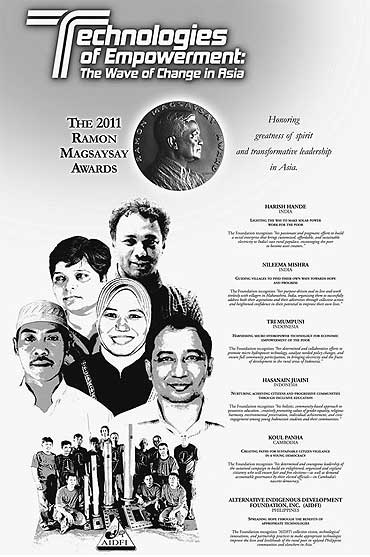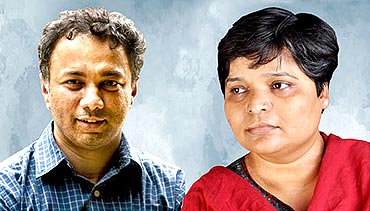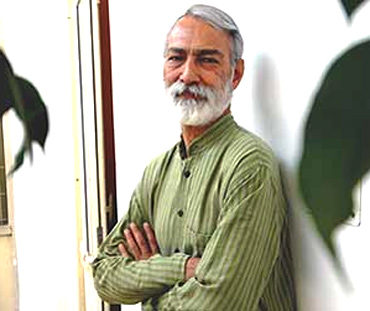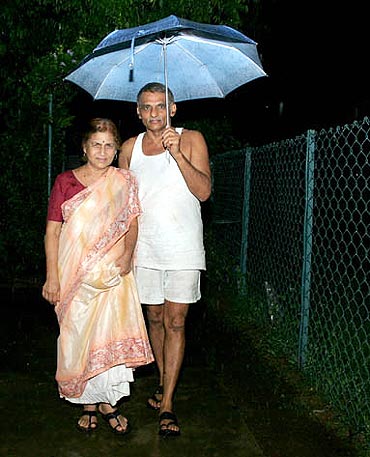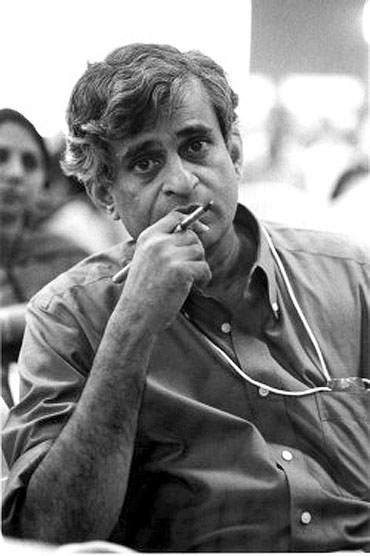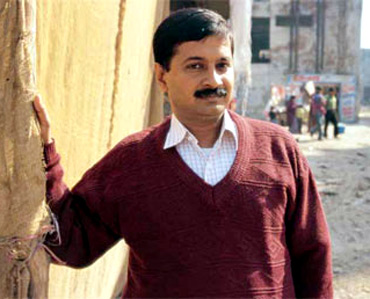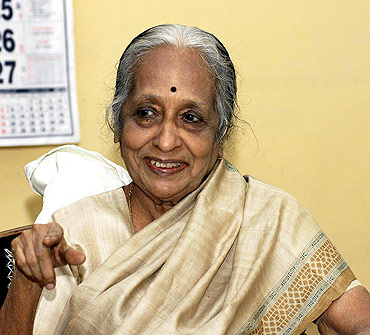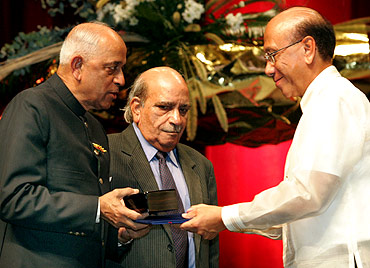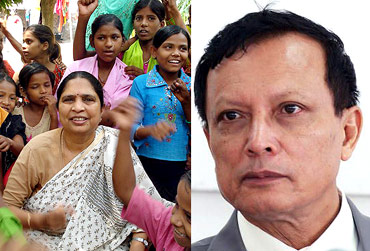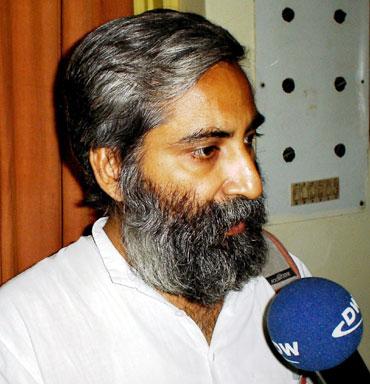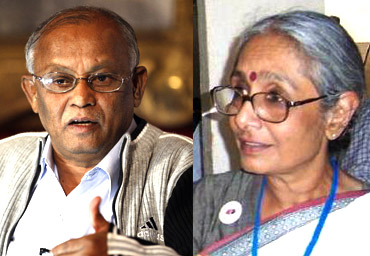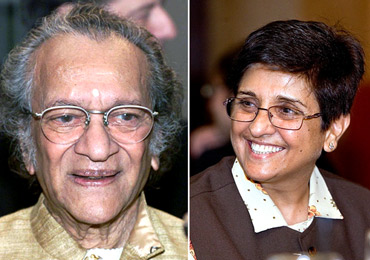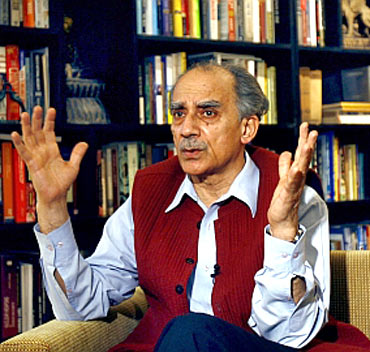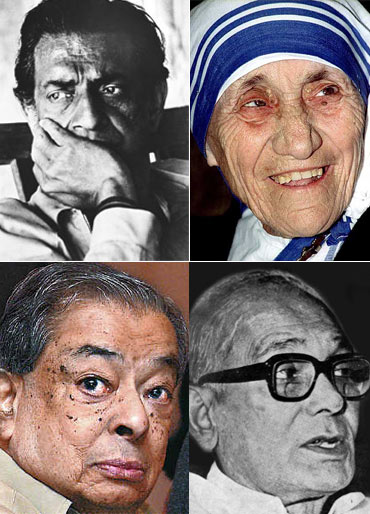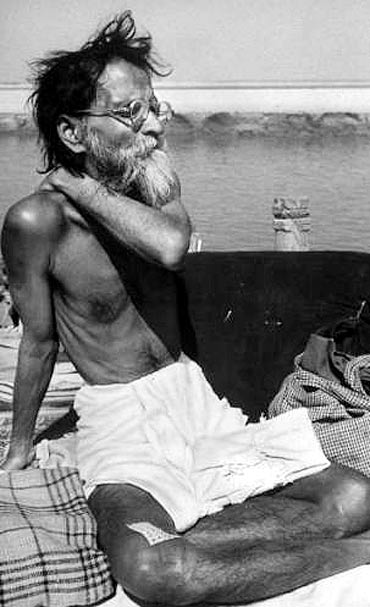 | « Back to article | Print this article |
India's glory at Magsaysay since 1958
The annual awards, named after the popular Philippine President who was killed in a plane crash in 1957, are widely seen as Asia's equivalent of the Nobel Prize.
The Magsaysay Award is an annual award established to perpetuate former Philippine President Ramon Magsaysay's example of integrity in government, courageous service to the people, and pragmatic idealism within a democratic society.
Every year the Ramon Magsaysay Award Foundation grants the prize to Asian individuals and organizations for achieving excellence in their respective fields.
The awards are given in six categories: Government Service, Public Service, Community Leadership, Journalism, Literature and Creative Communication Arts, Peace and International Understanding and Emergent Leadership.
Mishra and Hande's names will now be taken in the same breath as Indian greats like Vinobha Bhave, the first Indian to win the honour, Mother Teresa and filmmaker Satyajit Ray who are among the 46 Indians to win the award that were instituted in 1958.
Rediff.com takes a look at the awardees who have made India proud.
Click NEXT to read further...
2011: Harish Hande and Nileema Mishra
Harish Hande: A United States-trained engineer who revolutionised the use of solar lights was honoured this year for his passionate and pragmatic efforts to build a social enterprise that brings customised, affordable, and sustainable electricity to India's vast rural population, encouraging the poor to become asset creators.
He was recognised for bringing solar lights to a country where many households still have no power, the Magsaysay Award Foundation said.
He established Solar Electric Light Company-India in Bengaluru in 1995. SELCO's principal product offerings were solar PV lighting systems, water heating systems, and cook stoves to meet the needs of the rural poor. After five difficult years of operation, the company started to net a profit.
SELCO has since demonstrated that indeed the poor can afford sustainable technologies and maintain them, and that social ventures can be run as successful commercial entities. SELCO adopts a triple strategy for reaching the poor, a strategy of 'customised products', 'doorstep financing', and 'doorstep service'. It designs and installs solar technology applications based on each customer's specific needs, whether a two or four-light system for the home, head lamps for night workers like midwives and rose pickers, or electricity for sewing machines.
Nileema Mishra: Works with the poor villagers in Maharashtra is among five people who have been honoured with this year's prestigious Ramon Magsaysay Award.
In electing Mishra to receive the 2011 Ramon Magsaysay Award for Emergent Leadership, the board of trustees recognises her purpose-driven zeal to live and work tirelessly with villagers in Maharashtra, organising them to successfully address both their aspirations and their adversities through collective action and heightened confidence in their potential to improve their own lives, said the Magsaysay Award Foundation website.
In 1995, Mishra organised Bhagini Nivedita Gramin Vigyan Niketan in Bahadarpur, a village she hails from. Starting with a self-help group of only 14 women, other self-help groups followed, engaging in microcredit and such income-generating activities as the production of food products and distinctive exportquality quilts.
The success of Bahadarpur inspired Nileema to expand her work. In less than ten years, BNGVN has formed 1,800 self help groups in 200 villages across Maharashtra. And now there's no turning back.
Expressing happiness on winning the prestigious Ramon Magsaysay Award for 2011, Mishra said that women were her true inspiration. "Women today are empowered and they are true inspiration for everyone. I have felt this while working with 1,800 women self-help groups in north Maharashtra," she told reporters.
2009: Deep Joshi
Deep Joshi, a master in engineering from the Massachusetts Institute of Technology and a masters in management from the Sloan School, MIT, was given the honour in 2009.
A social worker and non-government organisation activist, he has been honoured for his vision and leadership in bringing professionalism to the non-government movement in India. He has done pioneering work for 'development of rural communities', by effectively combining 'head' and 'heart' in the transformative development of rural communities.
He co-founded a non-profit organisation, Professional Assistance for Development Action of which he is the executive director. In 2006, Deep received the Harmony Silver Award for his contributions to the society. Joshi said, "I am delighted to get this honour. But the award is not for an individual, it is for an idea, for the development of rural population. We need the educated people to go to rural areas and work for their welfare."
2008: Prakash and Mandakini Amte
Prakash and Mandakini Amte, a husband and wife team of doctors, were cited for community leadership for enhancing the ability of the Madia Gonds tribe in eastern Maharashtra to adapt to modern society through their healing and teaching work.
The Amtes abandoned their urban practices in 1974 when Prakash's father, renowned Gandhian humanitarian Baba Amte, called him to take over a new project among the Madia Gonds, who lived on hunting, gathering and shifting cultivation.
The couple moved to the remote Hemalkasa region and lived simply among the tribesmen, learned their language and patiently gained their trust.
The Amtes' 50-bed hospital and five doctors treat 40,000 patients a year for free. Their school introduced the tribe to settled agriculture -- growing vegetables, fruits and irrigated grains organically -- and encouraged conservation and protection of forests and wild animals.
2007: Palagummi Sainath
Palagummi Sainath, the rural affairs editor of The Hindu, was awarded the Ramon Magsaysay Award for 2007, in the 'Journalism, Literature, and Creative Communication Arts' category for "his passionate commitment as a journalist to restore the rural poor to India's national consciousness." Sainath became the sixth Indian journalist to win the award.
"Sainath's authoritative reporting led Indian authorities to address certain discrete abuses and to enhance relief efforts," read the citation.
"Sainath discovered that the acute misery of India's poorest districts was not caused by drought, as the government said. It was rooted in India's enduring structural inequalities -- in poverty, illiteracy, and caste discrimination -- and exacerbated by recent economic reforms favouring foreign investment and privatisation," it added.
2006: Arvind Kejriwal
The brazen corruption of high and mighty may grab headlines, but for the ordinary people it is the ubiquity of the everyday corruption that weighs the highest. Arvind Kejriwal, the founder of India's Parivartan, understand this, which is why his campaign for change begins with small things, read his citation.
"This award does not belong to me but to the entire right to information movement. It belongs to every individual who stands for transparency in governance," Kejriwal had said on receiving the award.
Even today, his crusade against corruption continues. He is on Gandhian Anna Hazare's core team that is pushing for the introduction of Jan Lokpal Bill.
2005: Dr V Shanta
In 2005, Dr V Shanta bagged the honour for public service.
Shanta was born to an illustrious family and raised in a world of books, ideas, and high achievement. Resisting the conventional path for women, she studied medicine at Madras Medical College and came under the spell of Muthulakshmi Reddy, a social reformer and India's first woman medical graduate.
In 1954, under Dr Reddy's leadership, the Women's Indian Association Cancer Relief Fund founded the Cancer Institute in Chennai. Drawn to Reddy's vision, young Shanta spurned a more lucrative post to join the institute. She has never left.
As the institute's associate director, Shanta set up India's first comprehensive paediatric cancer clinic, conducted the country's first major cancer survey, and developed its first program for the early detection of cancer in rural areas.
Simultaneously, Shanta conducted groundbreaking research on oral, cervical, and breast cancer and pediatric leukemia, publishing the results in international journals and establishing the Institute as India's first Regional Cancer Research and Treatment Center in 1975. In 1984, the Institute added a postgraduate college where Shanta proceeded to train cancer specialists, more than 150 of whom now practice throughout the subcontinent.
In 2000, she opened India's first hereditary cancer clinic.
2004: Laxminarayan Ramdas
The award was presented to Laxminarayan Ramdas, former Indian Navy chief and chairperson of the Pakistan-India People's Forum for Peace and Democracy, and Ibn Abdur Rehman, director of the Human Rights Commission of Pakistan for "their reaching across a hostile border to nurture a citizen-based consensus for peace between Pakistan and India."
"Amid wars, we persuaded in communicating," said Ramdas after receiving the award. "This provided encouragement to people that this must be sustained... We must learn managing for change. The best area of our concentration has been addressing the new generation so they can accept change as it arises."
"It is ultimately the people's will that must be represented. No bilateral agreement between two leaders can succeed unless it genuinely reflects the will of the people... Let humanity come first and nationality be pushed to the background," said the former Indian Navy chief.
2003: Shantha Sinha and James Michael Lyngdoh
Sinha is a leading anti-child labour activist. It was in her role as an anti-child labour activist, through the MV Foundation, that Sinha has attracted appreciation from various quarters.
MV Foundation, instituted in 1981 in memory of Professor Mamidipudi Venkatarangaiya, an eminent educationist and historian in southern India
"The award vindicates our stand that no child must work and that every child must attend full-time, formal, day school. The rural poor want to send their children to schools. But many (erroneously) believe that children must work. It is a harsh reality -- if they stop working, it is not possible for the families to survive. But it is not the right argument," she had told rediff.com on winning the award.
James Michael Lyngdoh: An Indian civil servant and chief election commissioner from June 14, 2001 to February 7, 2004, Lyngdoh was awarded the Ramon Magsaysay Award for Government Service.
In Jammu-Kashmir, where India was locked in a potentially explosive standoff with Pakistan and local secessionists, state elections fell due in 2002. Pushing ahead despite a vicious cross-border assassination campaign and a boycott, he updated and verified the election rolls, introduced voter identity cards, and added a thousand new voting sites. He urged the people "to vote fearlessly." Forty-four per cent did so. Even Lyngdoh's critics acknowledged that the polling had been fair.
During the 2002 Gujarat riots, when the ruling Bharatiya Janata Party dissolved the state government and called for elections amid the sectarian carnage, Lyngdoh used his authority to say no. Citing the large number of displaced persons and the pervasive atmosphere of fear in Gujarat, he postponed the elections. Although vilified for doing so, he stood his ground and carefully prepared for the delayed polls. He set up special polling places for Muslim refugees. In December, under tight security the people voted, some 61 per cent of them!
"Lyngdoh is a modest man known for his quiet ways and his transparent integrity. As a career civil servant, he has learned that it is best to avoid the limelight and the company of politicians. His impact lies elsewhere," read his citation. As one admirer puts it, "He has always been a quiet fighter from within."
2002: Sandeep Pandey
After receiving the award for Emergent Leadership he said recognition for him has come early in a country where there are scores of more deserving people involved in selfless social work.
In 1993, Sandeep Pandey quit his job at the Indian Institute of Technology-Kanpur, and plunged into working for Asha -- an education programme for underprivileged children.
It was in the summer of 1991 that Pandey, along with two other friends, founded Asha during his student days at the University of California, Berkeley. Today, the organisation has more than 35 chapters in India, United States and several other countries. Volunteers in each of these chapters identify education-related projects in India, and support them through funds and other means.
He denounced a government plan to favour Hinduism in state schools and called for an end to "the politics of revenge" that drives this country's communal violence. Warning against militarist nationalism, in 1999 he organised and led a 400-kilometer Global Peace March to protest India's nuclear arms programme.
Read: Sandeep Pandey's interview to rediff.com
2001: Rajendra Singh
The 2001 Ramon Magsaysay Award for Community Leadership was bagged by Rajendra Singh.
In the early 80s, Singh was an unknown government officer in Jaipur. But two decades later, he was internationally recognised for making dry rivers and ponds run with water in the Alwar district of Rajasthan. His pioneering work of building small water harvesting structures to trap rain water and recharge ground water earned him the Magsaysay Award.
Guided by Gandhi's teachings of local autonomy and self-reliance, Singh has introduced community-led institutions to each village. The gramsabha manages water conservation structures and sets the rules for livestock grazing and forest use. The mahila mandal organises the local women's savings and credit society. And the River Parliament, representing 90 villages, determines the allocation and price of water along the Arvari River.
He is the founder of an NGO called Tarun Bharat Sangh, which has been instrumental in fighting the slow bureaucracy and has helped villagers take charge of water management in their area, through the use of check dams and other time-tested as well as path-breaking techniques.
Tarun Bhagat Sangh, is supported by the United Nations and the World Bank. He was highly appreciated and recognised for the efforts he made for harvesting rain water by building check dams in Rajasthan. It is because of this he is popularly known as the 'Jal Purush' or the 'Water Man of Rajasthan'
2000: Jockin Arputham and Aruna Roy
Jockin Arputham: The winner of the 2000 Ramon Magsaysay Award for Peace and International Understanding, Jockin Arputham, has worked for more than 40 years in 'slums' and shanty towns, building representative organisations into powerful partners with governments and international agencies for the betterment of urban living.
Arputham is the president of the National Slum Dwellers Federation, which he founded in the 70s and of Slum Dwellers International which networks slum dwellers from over 28 countries across the world.
Along with fellow activists she formed the Mazdoor Kisan Shakti in 1990. Headquartered in the village of Devdungri, Rajasthan, their group accepted no external funds and spurned the trappings of prosperous NGOs. Living as the poor lived and eating as the poor ate, Roy and her comrades began assisting villagers to assert themselves against the local power structure.
1990s: Ravi Shankar and Kiran Bedi
Ravi Shankar: The sitar maestro won the 1992 Ramon Magsaysay Award for Journalism, Literature and Creative Communication Arts.
In electing Ravi Shankar, the board of trustees recognises his enriching India and the world with his sublime mastery of the sitar and with music "that colours the mind", read the citation on the Ramon Magsaysay Award Foundation website.
Although a brilliant innovator, in concert with the sitar Ravi Shankar remains a purist and adheres strictly to the fixed form of the raga. The remarkable spontaneity of his playing, the complex, psychological undertones that make his music feel so modern -- these effects are achieved through improvisations that occur wholly within the raga's traditional framework, it said.
Where the raga is concerned, says one admirer, he is "a thorough grammarian." Yet his stunning interpretations have helped to restore classical Indian music to robust popularity in India and to inspire a new generation of disciples.
Kiran Bedi: In 1994, Bedi won the Ramon Magsaysay Award for Government Service. A former Indian Police Service today she is backing Gandhian Anna Hazare in is fight against corruption.
In 1993, she became inspector general of prisons (Delhi) and took charge of Tihar jail, India's largest prison complex and rapidly transformed it. Today, ts inmates follow a positive regimen of work, study, and play. Illiterate prisoners learn to read and write. Others earn higher degrees from cooperating colleges.
The Magsaysay Award Foundation recognised her for building confidence in India's police through dynamic leadership and effective innovations in crime control, drug rehabilitation, and humane prison reform.
1980s: Arun Shourie
He has been an economist with the World Bank (1968-72 and 1975-77), a consultant to the Planning Commission, India, editor of the Indian Express and Times of India and a minister in the government of India (1998 2004).
But he received this recognition for being a "concerned citizen and employing his pen as an effective adversary of corruption, inequality and injustice", said the Magsaysay Foundation website.
As a journalist, he shook India's political hierarchy in 1981 when in the Indian Express Shourie revealed how the then Chief Minister of Maharashtra Abdul Rehman Antulay within a few months collected more than $5 million by creating artificial shortages of cement, industrial alcohol and other prime commodities, which he then allocated. After Shourie's expose, Antulay resigned.
In the 1980s, the others who were given the honour were:
1981: Gour Kishore Ghosh (Journalism, Literature and the Creative Communicative Arts)
1981: Pramod Karan Sethi (Community Leadership)
1982: Chandi Prasad Bhatt (Community Leadership)
1982: Manibhai Desai (Public Service)
1984: Rasipuram Lakshman (Journalism, Literature and the Creative Communicative Arts)
1985: Muralidhar Amte (Public Service)
1989: Lakshmi Chand Jain (Public Service)
1970s: MS Subbulakshmi
Among the many winners in 1970s the most prominent was legendary singer M S Subbulakshmi.
Leading exponent of classical and semi-classical songs MS received the the 1974 Ramon Magsaysay Award for Public Service. The foundation recognised her exalting rendition of devotional song and magnanimous support of numerous public causes in India over four decades.
At the age of 10, Subbulakshmi began accompanying her celebrated mother's singing and veena playing.
As, with maturing years, her versatility encompassed Hindustani classics of North India and folk songs of many regions. Her following grew far beyond the South; wider audiences first heard her in the film Meera.
Mahatma Gandhi asked only to hear her sing Hari Tuma Haro, on his 78th birthday, and Jawaharlal Nehru, after hearing her sing, said, "Who am I, a mere prime minister, before a Queen of Song?"
The others who won the award in this decade include:
1971: M Sambasivan Swaminathan (Community Leadership)
1975: Boobli George Verghese (Journalism, Literature and the Creative Communicative Arts)
1976: Henning Holck-Larsen (Peace and International Understanding)
1976: Sombhu Mitra (Journalism, Literature and the Creative Communicative Arts)
1977: Ela Ramesh Bhatt (Community Leadership)
1960s: Satyajit Ray, Mother Teresa, Verghese Kurien, Jayaprakash Narayan
Kurien is credited with being the architect of Operation Flood -- the largest dairy development programme in the world. Kurien helped modernise Anand model of cooperative dairy development and thus engineered the White Revolution in India, and made India the largest milk producer in the world.
Mother Teresa: She was given the honour in 1962 for International Understanding for her merciful cognisance of the abject poor of a foreign land, in whose service she has led a new congregation.
In 1950, she founded a congregation, the Missionaries of Charity, devoted entirely to the poor. Assuming Indian citizenship, she chose for the fledgling community a habit suited to its mission and locale -- a simple, white cotton sari edged with blue.
Mother Teresa and the small group of nuns she had trained started their work with clinics and feeding centers. Soon police and others began to bring to her doorstep children and adults left to die in the streets. Determined that these unwanted must have a place to spend their last days in peace, she founded, in 1952, in an ancient, teeming quarter of Kolkata, the Nirmal Hriday, -- a unique hospital for dying destitutes.
Following her death in September 1997, she was beatified by Pope John Paul II and given the title Blessed Teresa of Calcutta.
Jayaprakash Narayan: The 1965 Ramon Magsaysay Award for Public Service went to Jayaprakash Narayan. Widely known as Loknayak (leader of the masses), Narayan an independence activist and political leader, is remembered especially for leading the opposition to Indira Gandhi in the 1970s and for giving a call for peaceful Total Revolution.
In 1998, he was posthumously awarded the Bharat Ratna, India's highest civilian award, in recognition of his social work.
Satyajit Ray: Satyajit Ray was given the hounour in 1967 for Journalism, Literature and Creative Communication Arts. The legendary filmmaker is regarded as one of the greatest auteurs of 20th century cinema. He was recognised by the Magsaysay Foundation for the "uncompromising use of the film as an art, drawing themes from his native Bengali literature to depict a true image of India."
Other Magsaysay awardees in the 1960s were:
1961: Amitabha Chowdhury (Journalism, Literature and Creative Communication Arts)1
1963: Dara Khurody (Community Leadership)
1963: Tribhuvandas Patel (Community Leadership)
1964: Welthy Fisher (International Understanding)
1966: Kamaladevi Chattopadhyay (Community Leadership)
India's first Magsaysay award winner: Vinoba Bhave
Often called Acharya, he was an advocate of non-violence and human rights. He is best known for Bhoodan Andolan, which was a voluntary land reform movement started by in 1951 started at Pochampally village.
The Bhoodan mission was to allow wealthy landowners to voluntarily give a percentage of their land to lower castes. Bhave walked across India on foot, and as it has been well recorded, was quite persuasive.
